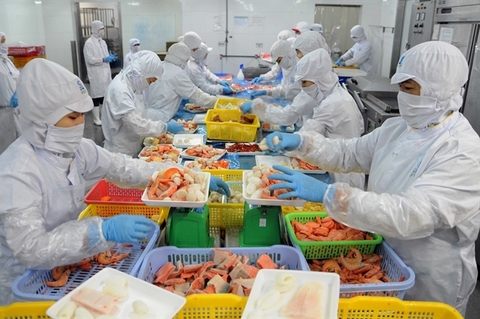
Seafood processed at Sai Gon Food JSC in HCM City is exported to overseas markets such as Japan and Europe. Vietnamese firms are urged to accept rising opportunity costs to get the fastest access to European consumers once the trade pact EVFTA takes effect in May. — VNA/VNS Photo An Hieu
Policies and regulations must be ready once the Europe-Viet Nam Free Trade Agreement (EVFTA) is approved so Vietnamese enterprises can reap the benefits of the trade pact, experts said on Monday.
The EVFTA trade pact was signed on June 30 last year and was ratified on February 12 this year by the European Parliament. Specialists and companies expect the deal will be approved by Viet Nam’s National Assembly deputies in May 2020 so that it officially takes effect.
If approved, Vietnamese companies will be able to tap a huge market with a population of 508 million and a total GDP of about US$19 billion.
Luong Hoang Thai, director of the Multilateral Trade Policy Department under the Vietnamese Ministry of Industry and Trade, said if the pact is approved at the coming National Assembly meeting in May, work must start on the legal framework immediately.
Policies and regulations must be prepared and ready so they can become effective once the deal is passed, he said.
The ministry is developing a circular to instruct the implementation of the EVFTA, Thai said, adding that it's scheduled to take effect once the trade pact is official to help local businesses access European markets.
Other sectors and ministries also need to start studying the EU’s rules on preferential tax rates, origin certification and public procurement and bidding, he said.
“The ratification of the EVFTA is a must to help Vietnamese companies seek ways to penetrate European markets, especially when they are suffering from the coronavirus pandemic,” Thai said.
“The deal only gives us the opportunity. What matters now is what and how Vietnamese authorities and businesses do to take advantage of the chance,” he said.
The preparations for the deal coming into force may be long, so Government, ministries, agencies and local enterprises must improve their competency to meet European markets’ standards, Thai said.
“The EVFTA should be considered a win-win policy for both sides… It sets no barriers for local firms but gives targets and solutions for them to achieve,” he said.
According to Nguyen Thi Thu Trang, Director of the WTO Integration Centre under the Vietnam Chamber of Commerce and Industry (VCCI), the EVFTA can be seen as “an expressway” which can help Vietnamese firms find the fastest access to European consumers.
But few firms can travel on the expressway as they need to be prepared for tolls, service roads and bumps, she said.
In general, Vietnamese firms are less competent than European companies but they still have advantages in some fields, Trang said, adding that Vietnamese and European products are supplements, not alternates.
Accepting opportunity costs would help local firms hit European markets faster, the VCCI official said.
“Vietnamese firms must learn that to meet European standards, they need to make changes in the production and purchasing of raw materials from local suppliers instead of foreigners,” she said.
Viet Nam’s legal system could also be changed to match European rules and that is another opportunity cost local firms must accept, she urged. — VNS